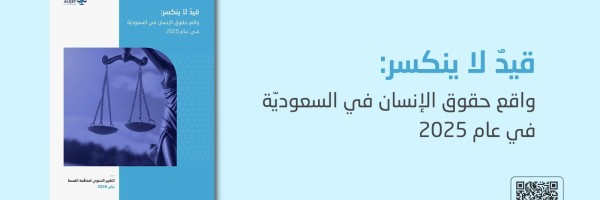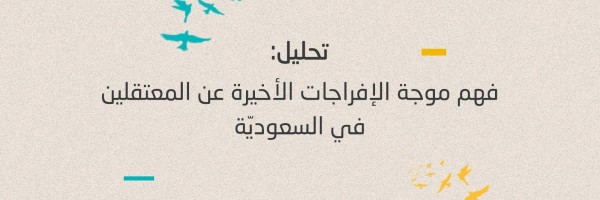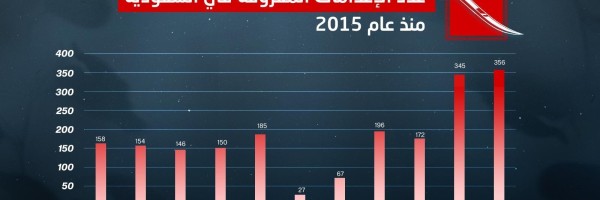It is just over a year since the arrest of Dr Mohammed Saleh al-Khudari, a leading Palestinian official and long-term resident of Saudi Arabia, and even longer since the mass arrests of dozens of other Palestinian, Jordanian and Saudi figures associated with the Palestinian cause. The Saudi authorities have ignored repeated calls for the group to be released, including appeals from a number of United Nations Special Rapporteurs and UN working groups. Al-Khudari and several others were arrested on 4 April 2019, but they were not the first: the authorities had already carried out raids and arrests in a number of cities, rounding up dozens of people.
At the beginning of February 2019 the authorities arrested Dr Amer al-Alma’i, an internal medicine consultant, together with a group of Palestinians in the city of Abha. A similar wave of arrests had been carried out the previous day in Jeddah. Those targeted were prominent Palestinians and Jordanians with a connection to the Palestinian cause. We know of 68 such persons arrested, in addition to 13 Saudis.
Subsequent to these arbitrary arrests, the Saudi authorities forcibly disappeared a number of those detained, denying them their rights of access to legal counsel, visits and phone calls for up to five months. Some were not even able to inform their relatives of their arrest, and were only allowed to contact their families for the first time in July 2019.
Last month, on 8 March 2020, the 68 Palestinians and Jordanians were brought before the Specialised Criminal Court, the Saudi court that handles terrorism-related cases. Neither their relatives nor international observers from foreign embassies were able to attend the trial, and there were no independent lawyers present. The trial thus took place in a court that had no independence and failed to meet any of the conditions for fair trials. In court, the Public Prosecutor read out the charges against the group, and then they were allocated to designated groups to appear in court on several days during the upcoming month of Ramadan (late April to late May 2020).
Having reviewed a number of the charges brought against the group, ALQST can see that most of them revolve around membership of the Palestinian group Hamas and the Muslim Brotherhood, collecting donations for Palestine, and using the Internet to write about the Muslim Brotherhood. The Public Prosecutor has invoked the country’s Counter-Terrorism Law (notably Articles 32, 33, 38, 47, 53 and 55) and Anti-Cybercrime Law, especially Article 6. The prosecution has made specific accusations such as: belonging to a terrorist faction; funding a terrorist faction; communicating with a terrorist faction; concealing a terrorist faction; and storing and keeping items that might help a terrorist faction. Among items confiscated from the detainees was a book called “Palestine: A History in Pictures” by Tareq Suwaidan.
ALQST therefore maintains that the Saudi authorities carried out sweeping raids and arbitrary arrests not based on any court order or legal arrest warrants, after which a number of the detainees were forcibly disappeared and deprived of basic rights like access to independent lawyers, phone calls, visits and medical treatment. These 68 detainees were then brought before an illegal court, even though the Saudi authorities have received numerous human rights directives urging them to dissolve this court that epitomises the Saudi judiciary’s lack of independence.
The authorities also used Article 6 of the Anti-Cybercrime Law, which clearly violates the right to freedom of expression, as well as the Counter-Terrorism Law, which criminalises legitimate and peaceful civil actions, and which the Saudi authorities undertook to amend following widespread criticism. They did amend the law, but when ALQST compared the new version, promulgated on 1 November 2017, with the original Counter-Terrorism law, we came to the conclusion that it had the same flaws as its predecessor. Furthermore, the charges that ALQST has seen being levelled against the group are unlawful, since they cannot be determined in law, and since they describe as terrorist an organisation with which the authorities have official dealings and some of whose leading figures it hosts. This clearly demonstrates that the trial, and before that the detention of these individuals, with all the associated violations of their rights, is purely politically motivated and has nothing to do with breaking laws or committing crimes.
ALQST calls on the Saudi authorities to immediately and unconditionally release the group of 68; to settle this issue without violating any of their lawful rights; and to finally end use of the law, legal regulations and the courts for political purposes that inflict damage on dozens of families. ALQST also calls on the international community to press the Saudi authorities to end these blatant abuses and settle this issue, which cannot possibly be seen as a genuine legal case.




